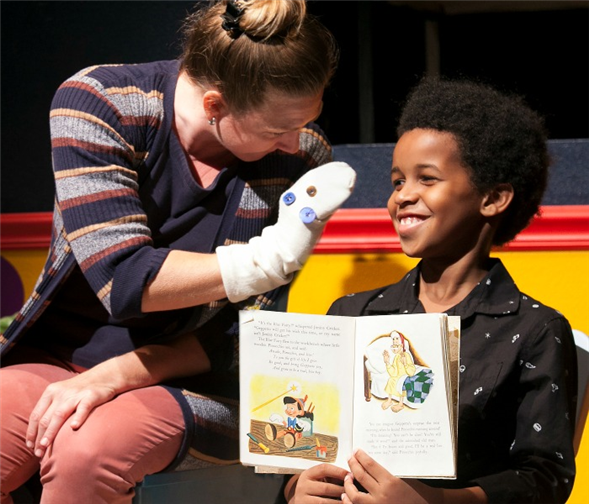Translate Page

A playwright explores the plight of a very unconventional family
---
Ms. Terry's worried. All of the other kindergarteners have a full set of crayons while Max Myers comes to school with only two in his backpack: one black, one white. How heartless of his parents to consign their only child to a life without color! And she's right, they are heartless -- literally. Made of wood and string, they are marionettes raising an adopted human child.
The Myers are at the center of Stephen Kaplan's allegorical satire A Real Boy, running through August 27 at 59E59 Theaters. Despite its absurd premise, the play was partially inspired by Kaplan's experiences with his own nontraditional family: he and his husband have a ten-year-old son.
Kaplan started crafting A Real Boy five years ago while taking part in a Kennedy Center workshop in Washington, D.C. A die-hard Muppets fan, he decided early on that he wanted to integrate puppets into the piece. But he also wanted to write about "people who try to tell me what my family should and shouldn't be," he remembers. In a sense, he fused his passion with his frustration and wound up with a drama in which "puppets are the 'other.'"
Kaplan has woven that theme of difference into the fabric of the characters. "In the script itself, it's specified that the puppets are a white, cisgender, heterosexual couple," he says. "But the puppeteers should be anything but that, representing anything that would not be considered, along social norms, a traditional family."
{Image1}
Two black male actors (Brian Michael and Jason Allan Kennedy George) control the wedded marionettes, evoking racial tensions when the Myers face off against a white schoolteacher and principal. Then there's gender and sexuality. Watching the show, it's hard not to transfer the puppets' relationship onto their manipulators. The puppeteers become husbands (in my mind, at least). Yet why was I viewing George, who operates Mrs. Myers, as a man when he's in a dress affecting a female voice, clearly playing a woman? The malleability of identity in A Real Boy is tricky indeed, especially when Max starts sprouting strings. Is he destined to become a puppet like his parents? How do we become who we are -- nature or nurture?
In his own life, Kaplan couldn't help wondering this in regard to his son, who "has always been more interested in things like My Little Pony than Power Rangers," the playwright says. When the boy was a preschooler, Kaplan "started recognizing in myself this kind of internalized homophobia. Whatever he happens to be, I'm obviously happy, but I don't want people to blame us for that happening."
So what will come of Max? Will Ms. Terry, well-intentioned if overzealous, snip his budding strings so that he can pass as human? Or does Max have no choice but to become a marionette? Or, in defiance of either-or, might he find a way to be both a real boy and a puppet? In a society in which identity seems to be becoming more fluid every day, perhaps Max -- and Kaplan's son -- won't have to commit to any labels.
---
Gavin Whitehead is a writer and dramaturg based in New Haven.
Top image: Jenn Remke and Alexander Bello in A Real Boy. Photos by Heidi Bohnenkamp.
TDF Members: Go here to browse our latest discounts for theatre, dances, and concerts.